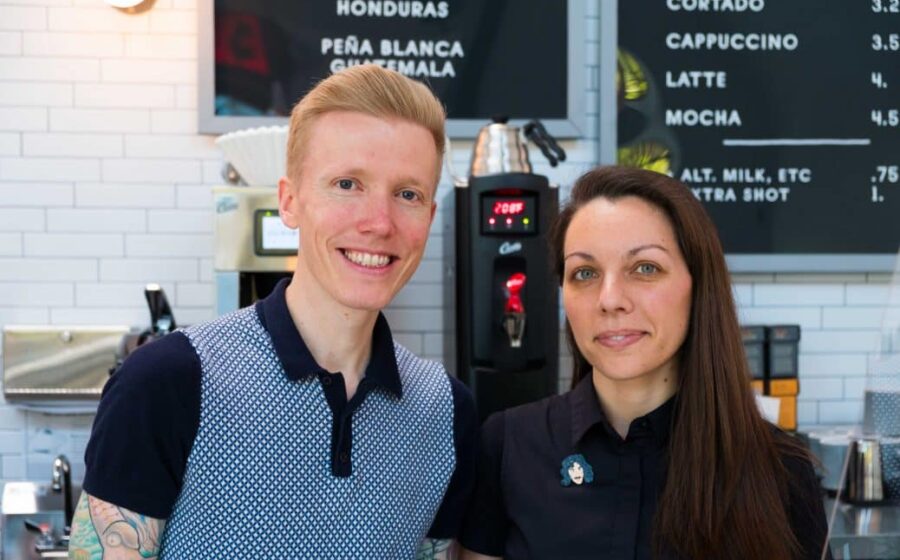[S]itting at a table in the loft of his spacious new café—operated with cofounder and wife Caryn in Portland, Oregon—Nelson explains why Guilder (named after The Princess Bride) is the latest expression of his ongoing mission to push the coffee industry toward the marriage of scientific research and coffee production practices: “academia and coffee have always been inseparable for me,” says Mike Nelson.
As a PhD student at Florida State University, Nelson studied human environment geography. His research focused on the effectiveness of the spread of information on coffee leaf rust in Costa Rica to coffee producers, and ultimately he ended up narrowing his attention to data on the cost of production. “Turns out there’s a lot,” he says, “but it’s hard to actually do something with that info.”

Analyzing massive quantities of data is challenging; another problem is the difficulty of context. It’s impossible, for example, to apply cost of production data from Guatemala to Ethiopia. These challenges are further complicated by a single truth: we should be paying higher prices for coffees, which is not yet a universally acknowledged fact.
Much has been said about the plight of the modern coffee farmer, who often operates at a loss. Nelson thinks that understanding the cost of green coffee production and communicating it to each stakeholder in the value chain is essential to improving this problem. At the roastery level, this means careful selection of importing partners and applying his educational background to help the farmer. In the café, this translates into a commitment to breaking down price transparency with customers, to the point of eventually communicating Guilder’s own costs to guests.
Nelson’s background makes him well suited to pursue these admittedly ambiguous goals. His barista, roasting, and consulting credits include Stumptown Coffee, Heart Coffee, Blue Bottle, the American Barista and Coffee School, and various Scandinavian specialty coffee companies. Most of the time, he’s been enrolled in programs focusing on environmental sustainability while working in coffee.
Nelson is taking the beginning steps toward applying cost of production analyses at the origin level, supported by Caryn’s strong background in social enterprise and nonprofit work, as well as cofounder Toby Roberts’s strong financial background—after years as Director of Financial Operations for Pok Pok, he is now President of the famous restaurant group—and with full support of cofounder Carrie Lind.
Guilder offers Junior’s Roasted Coffee, the roasting arm of the Nelsons’ business endeavor. As a small roasting company, buying power is limited. Currently Nelson is in talks with two coffee producers, one in Guatemala and one in Colombia, about multi-year projects to track and analyze the costs associated with their green coffee production. These discussions are facilitated by Junior’s importing and exporting partners, Terra Negra, Fairfield Trading, and Collaborative Coffee Source. “My hope is that by embarking on these projects we can serve as an example. If it is successful working on a small scale, say buying ten bags, then hopefully down the road it scales to entire containers,” Nelson says.
Feedback from most importers on the project is mixed, since a lot of the data are trade secrets, and while the exporters he’s spoken with give positive feedback, Nelson acknowledges the complexity of the industry and points out that coffee prices are universally too low for the cost of production. “Companies like Counter Culture, Kickapoo, and Onyx Coffee Lab continue to be a beacon of hope in the industry. At Guilder and Junior’s, we are working toward understanding the true cost of a pound of green coffee, and finding creative ways to support that.”
In the future, Junior’s plans to offer microfinancing to producers, and envisions a model of sourcing for wholesale customers similar to a CSA (Community Supported Agriculture): wholesale clients commit to purchasing a set portion of coffee from a particular farmer, who receives pre-financing for the coffee. Given the risks inherent in this structure, Nelson acknowledges it might take a while to get off the ground. “We are hoping the cost of production project will open the doors with producers.”
For producers, Nelson’s willingness to apply his training for their benefit is a solid value-add, though, like all intercultural projects, it may take some time to launch. For consumers—both wholesale clients and the guests at Guilder—the benefits will grow as the café and roasting company build the financial data to present cost analyses at the cup level.
Meanwhile, Nelson hopes that the dialogue will catch on, and that other companies in Portland will join Guilder’s attempts to return profit to origin and seek accountability.
Other Portland-based companies, such as Nossa Familia, are also releasing cost analysis in partnership with importers and producers (see the cost breakdown in this sustainability report). The hope is that a few such intentional coffee companies can tip the industry toward a more even distribution of wealth, and that momentum will increase with each coffee that is purchased with this in mind.
—Emily McIntyre is a regular contributor to Fresh Cup, and the co-founder of Catalyst Coffee Consulting and Crema.co.











